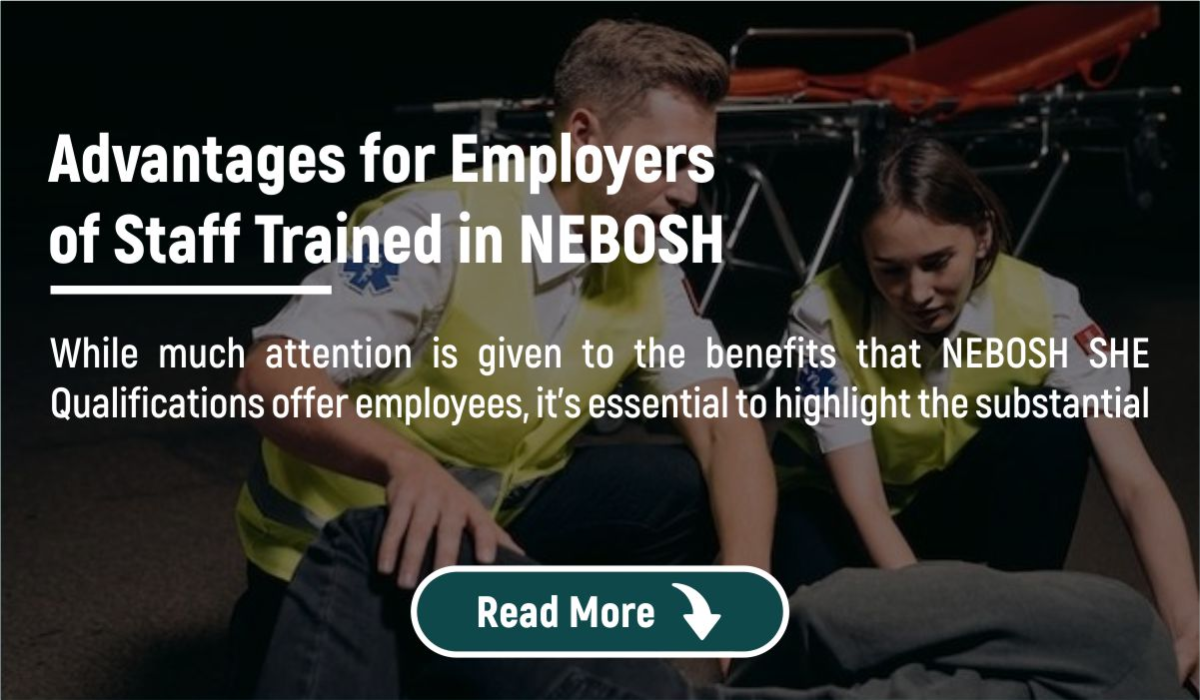
Advantages for Employers of Staff Trained in NEBOSH
Why Professional Training Could Transform Your Workplace
While much attention is given to the benefits that NEBOSH SHE Qualifications offer employees, it’s essential to highlight the substantial benefits employers gain from having NEBOSH-trained staff. Here’s an overview of how professional training can transform your workplace and protect your staff.
NEBOSH
Established in 1979, NEBOSH is a globally recognized leader in Health, Safety, and Environmental Management qualifications. With course providers in over 132 countries, NEBOSH offers training for all workforce levels, from level 2 to Diploma level qualifications. They also collaborate with universities to provide postgraduate Master of Science (MSc) qualifications.
NEBOSH’s extensive network has made it one of the most respected and recognized awarding bodies, receiving "Approved Awarding Body" status from the Scottish Qualifications Authority (SQA) in 2009.
Qualifications for All Business Types
NEBOSH qualifications extend beyond Health and Safety, covering various topics and allowing specialization in areas such as:
- Construction
- Fire
- Health and Well-being
- Environment
- Oil and Gas
- Process Safety (in collaboration with the HSE)
These qualifications cater to all business types and have broad applications. Many are available as National (UK-based) or International qualifications, making them versatile for students and businesses aiming to expand globally. The content and style of these qualifications are regularly updated to reflect changes in practice and new developments.
Reasons to Train Employees to a NEBOSH Standard
Training employees to a NEBOSH standard provides several key benefits:
Legal: It is a legal requirement to ensure workers have the knowledge, skills, and experience to perform their tasks safely and without risk to others and the environment. NEBOSH qualifications make workers aware of organizational statutory requirements and their obligations.
Moral: Employers have a duty of care to their workers and those affected by their actions. Educating workers in risk management and control demonstrates a commitment to working safely and considering workers, the public, and the environment.
Economic: Using qualified and knowledgeable staff improves recognition with suppliers, consumers, and industry members, positively impacting the business. Educated workers are more aware of risks and controls, reducing costly accidents and incidents.
Competence
Competence in environmental, health, safety, and management circles is defined by the HSE as the "combination of training, skills, experience, and knowledge that a person has and their ability to apply them to perform a task safely."
Dame Judith Hackett, former Chairperson for the HSE, said:
"The essence of competence is relevance to the workplace. What matters is that there is a proper focus on both the risks that occur most often and those with serious consequences. Competence is the ability for every director, manager, and worker to recognize the risks in operational activities and then apply the right measures to control and manage those risks."
NEBOSH qualifications enhance staff development from the shop floor to senior management. Specialized qualifications improve knowledge, skills, and management throughout an organization. This increased competence leads to safer processes, specialized areas, the environment, and better cooperation among workers.
Using the same awarding body for training across different areas standardizes the training, promoting synergy throughout departments and management levels. This standardization is especially useful for organizations seeking accreditation for specific management systems like ISO 9001 (quality assurance), ISO 45001 (Health and Safety), or ISO 14001 (environmental).
Rewards
Beyond business benefits, NEBOSH training offers softer yet essential rewards:
Happier Staff: Employees who feel valued by their employer are more loyal, enthusiastic, and happy in their work.
Confident Workers: Increased knowledge and achievements boost self-confidence and belief in their abilities. Understanding their tasks and the health, safety, and environment around them promotes positive work ethics.
Increased Morale: Enhanced competence and confidence raise workforce morale, ensuring a positive work ethic and outlook.
Commitment: Training and encouraging progress fosters loyalty and commitment to organizational goals. Workers feel valued and invested in, leading to greater organizational loyalty.
